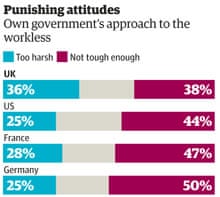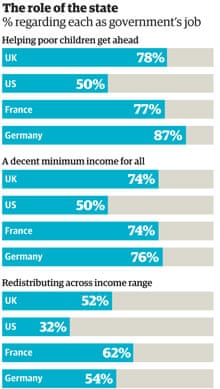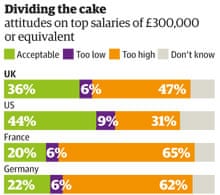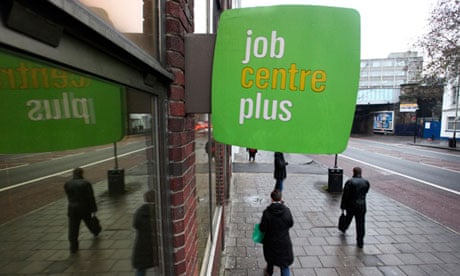Britons are less inclined than the French to regard the workless as indulged, readier than the Germans to pay taxes to help them, and decidedly less relaxed about top salaries than the Americans, according to a major transnational study by the academic thinktank YouGov-Cambridge, which put identical questions to voters across four democracies at the same time.
The findings – shared exclusively with the Guardian – also demonstrate that Britons retain a European-style sense that the state has sweeping societal responsibilities, in defiance of Margaret Thatcher's 1980s efforts to shift the onus on to the individual. Most Britons, 52%, regard it as the government's job to redistribute income right the way across the income spectrum, as against the distinct minority of Americans, 32%, who take the same view.

Amid the most protracted economic slump in living memory, the data – prepared before a YouGov-Cambridge conference week, at which the Guardian is media partner – records considerable resentment towards the "undeserving poor" across the western world. In France, fully 47% of voters say their government is "not being tough enough towards people on benefit, and more should be done to force them into work", against just 28% who say that the government is "too harsh" on jobless people, "most of whom would like to work if they could".
That crushing margin in favour of greater toughness is closely mirrored by a 50%-25% split in Germany and 44%-25% in the United States.
In Britain, however, opinion is much more closely divided – 36% say the government is "too harsh", a statistical dead heat with the 38% who believe the government is not being tough enough. The relatively gentle British mood towards the poor is all the more striking because it comes together with UK-only YouGov polling which reveals that the coalition retains the edge in the day-to-day tactical tussle over benefit cuts – by 48% to 41%, British voters say that the chancellor was right to link the case of Mick Philpott, who started a house fire which killed six of his children, to the wider debate about social security, a link that Labour criticised him for making.
But while the opposition message fails to cut through, the bite of government policy is undoubtedly being felt: 56% of British voters report that government cuts are having an impact on their own lives, against just 34% who report feeling no pain – and the pain of retrenchment would appear to be persuading Britons of the attraction of holding on to activist government.

The least contentious duty of the welfare state is securing equal opportunities, by "ensuring that rich and poor children have the same chances to get ahead". By a 78% to 14% majority, Britons agree that this "should be the government's job", a crushing majority closely mirrored in figures of 77%-17% in France and 87%-8% in Germany.
Americans, too, endorse this conception, but more narrowly – by 50% against 36% who insist that even this goal should not be the government's job. The detailed data reveals that state-sceptic Republicans reject even this notion out of hand – by 68% to 22%.
A somewhat more expansive social policy includes not merely, in Churchill's phrase, "the ladder" of opportunity but also a safety net. Asked if it is the job of government to make "sure that every family has a decent basic minimum income" three-quarters of Britons, 74%, agree, against just 16% who believe this should not be the state's concern. This puts the UK almost precisely in line with both France, where the majority is 74%-18%, and Germany, at 76%-16%.
Again, however, it is very different from the picture in the US. Americans accept that providing a decent minimum income is the government's job by a much narrower margin, of 50% to 37%.
A more fully fledged conception of an active state includes a duty to redistribute "from the better-off to the less-well-off right across the income range". This is inevitably more contentious, but even here a majority of Britons are in agreement: 52% see this as the government's job, as against 31% who believe it is not. That makes British opinion almost indistinguishable from that in Germany, where the balance of opinion on this question is 54% to 31% in favour, if a little less leftish than France, where the figures are 62% to 24%.
The figures in all three European countries, however, are the opposite of those in the US: Americans reject a redistributive role for government by 50% to 32%. The detailed data reveals that opposition to the state taking on this role rises to 80% among Republicans.
Support for solidaristic principles must always be subjected to the test of selfish pockets, and YouGov-Cambridge thus asked respondents whether they would "support an increase in the funding of government programmes for helping the poor and the unemployed with education, training, employment, and social services, even if this might raise your taxes".
Again, Britain emerges as a strikingly un-Thatcherite country. The majority for that proposition in the UK is 35 points (54% to 19% against), compared with 26 points in France (63%-37%), 23 points in the US (52%-29%) and a much more marginal two points in Germany, where 36% are in favour of this New-Deal-style pitch and 34% against. Perhaps the perception that German pockets are already being picked to subsidise southern Europeans who have hit hard times is taking its toll on willingness to contribute towards support for the poor at home.
Progressive Americans, by contrast, will be heartened to learn that the legacy of Franklin Roosevelt is not dead – but shocked by the underlying party divide. Whereas Democrats split 75% to 8% in favour of using tax-financed services to smooth the recession's rough edges, Republicans are heavily against, by 59% to 24%.

It is not just government tax policy, but also company pay policy that has a bearing on people getting filthy rich. As a final test of whether opinion across the four democracies shares Peter Mandelson's intense relaxation about this, YouGov-Cambridge asked respondents for their views on a top earner, such as a boss in a big company, earning 20 times as much as a low-wage worker, with the monetary values expressed in local currencies, so the respective wages at the two ends of the spectrum were, for example, an annual £300,000 and £15,000 in the UK. America's traditional image as a land that celebrates economic success shines through, with a clear majority of 53% believing that this sort of top wage is either acceptable (44%) or too low (9%), as against just 31% who believe that top salaries of $400,000 are excessive.
In continental Europe, attitudes are very different. Only 26% of French voters believe that a €400,000 wage is acceptable (20%) or too low (6%), as against fully 65% who believe that it is too high in an economy where other workers are bringing in €20,000. The 62%-28% majority believing that this wage gap is excessive in Germany is only slightly less emphatic.
This is the one measure on which Britain's view might be described as mid-Atlantic. Some 42% believe that such a top wage is either acceptable (36%) or too low (6%), a large minority that is only modestly outnumbered by the 47% who believe that this sort of pay gap is excessive.






